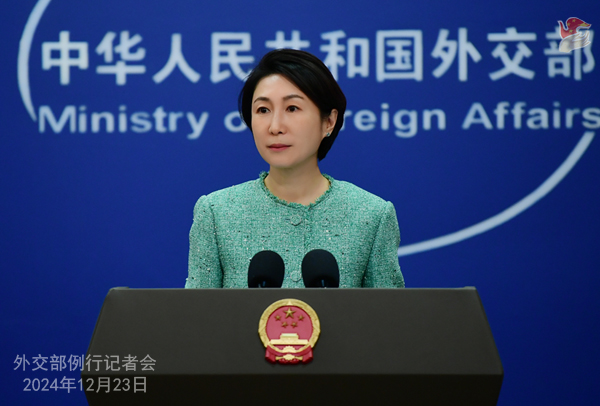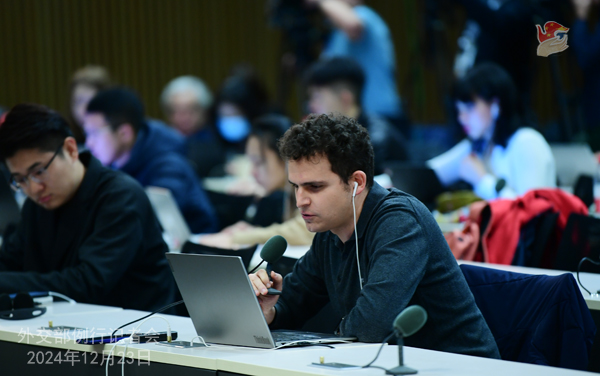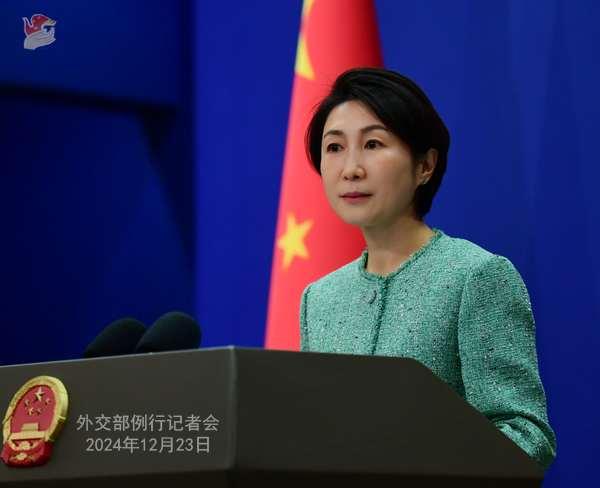
China News Service: On December 21, the Foreign Ministry announced on its website the decision to take countermeasures against certain Canadian institutions and personnel. Could you brief us on the background of this decision?
Mao Ning: Recently, the Canadian side sanctioned Chinese personnel citing so-called human rights violations. In accordance with the Law of the People’s Republic of China on Countering Foreign Sanctions and for the purposes of safeguarding national sovereignty, security, and development interests and protecting the lawful rights and interests of Chinese citizens and organizations, China decides to take countermeasures against relevant Canadian institutions and personnel.
We once again strongly urge the Canadian side to stop interfering in China’s internal affairs in any form and stop its political manipulation on human rights issues.
EFE: US President-elect Donald Trump said recently that the Panama Canal is considered “a vital national asset for the US,” and he threatened that they will demand that the Panama Canal be “returned to us.” Does China have any comment on this?
Mao Ning: We noted Panama’s President Jose Raul Mulino has issued an open statement on this. He stressed that every square of the Panama Canal and its adjacent area belong to Panama and the sovereignty and independence of the country are not negotiable. He added that rates are not a whim and the Canal has no control, direct or indirect, from any power.
The Panama Canal is a great creation of the people of Panama. It is a golden waterway for connectivity among countries. China has always supported the people of Panama in their just cause for sovereignty over the Canal. Dating back to the 1960s, large-scale demonstrations took place across China, which had been vocal in supporting the people of Panama in their struggle to regain their sovereignty over the area of the Canal. China will as always respect Panama’s sovereignty over the Canal and recognize the Canal as a permanently neutral international waterway. We believe the Canal will continue to make new contributions to facilitating integration and exchanges between people of different countries and enhancing humanity’s well being.
Global Times: It’s reported that on December 20, the US Congressional-Executive Commission on China (CECC) released the 2024 Annual Report, accusing the Chinese government of increasingly interfering with the affairs of Hong Kong and Macao in violation of the One Country, Two Systems principle. What’s your comment?
Mao Ning: There is nothing credible about the commission you mentioned which keeps attacking and smearing China for political agenda. It releases the so-called report year after year to mischaracterize the human rights conditions and the practice of One Country, Two Systems in Hong Kong and Macao. China deplores and firmly opposes this.
Since the return of Hong Kong and Macao to the motherland, the systems for implementing the policy of One Country, Two Systems have kept improving, economic and social development has seen a historic leap in the two regions, the rights and freedoms of residents in Hong Kong and Macao have been fully protected, and they enjoy a much stronger sense of gain, happiness and security. This has proven to the world that the cause of One Country, Two Systems, with its distinctive institutional strengths and strong vitality, is a good system that sustains the long-term prosperity and stability of Hong Kong and Macao. It is a good system that facilitates endeavors to build China into a great country and achieve national rejuvenation, and it is a good system for ensuring peaceful coexistence and mutual benefit between different social systems. So we must stay committed to this cause in the long term.
With the full support of the central government and collective efforts of people from all sectors in Hong Kong and Macao, the cause of One Country, Two Systems will be further advanced and the future will shine even brighter for both regions.

CCTV: The Group of “Friends for Peace” on the Ukraine crisis recently held a meeting again in New York and a press release was published after the meeting. Can you share more information on that?
Mao Ning: The Group of “Friends for Peace” on the Ukraine crisis recently had the second meeting in New York. Representatives from 17 Global South countries, including China, Brazil, Algeria, South Africa and Türkiye attended the meeting. A press release was published after the meeting, which spoke positively about the Ministerial Meeting in September and the joint communiqué issued after the Ministerial Meeting, noting that the joint communiqué was the first time that countries which predominantly represent the Global South voiced their concerns about the Ukraine crisis. The participants reviewed the current situation of the conflict in Ukraine and potential developments, expressed concerns at the escalation of the conflict, and reaffirmed the key principles, including respecting the sovereignty and territorial integrity of states, respecting the legitimate concerns of states, and the importance of peaceful solutions for all international conflicts. They also recalled the need to observe principles for de-escalation and the importance of non-expansion of the battlefield and non-intensification of fighting, called for support for a comprehensive and lasting settlement by the parties to the conflict through diplomacy and political means based on the UN Charter and international law, and supported countries from the Global South in playing a constructive role to this end. China stands ready to work with other members of the group to make positive effort for an early realization of peace.
AFP: The Financial Times has reported that Sweden has criticized China for refusing to allow the Swedish public prosecutor aboard the Yi Peng 3, the Chinese vessel suspected of severing two Baltic Sea cables right before it sailed away on Saturday. Does China have a comment on this?
Mao Ning: As I have learned, China has invited Germany, Sweden, Finland and Denmark to participate in and complete a joint fact investigation and has shared documents and information. To cooperate with the investigation, Yi Peng 3 has been anchored for a long time. For consideration of the crew members’ physical and mental health, the owner company decided to let the vessel resume its voyage after a comprehensive assessment and consultation with relevant parties. The Chinese side has notified relevant countries in advance. China stands ready to maintain communication with relevant countries and continue working together to handle the matters related to the incident afterwards.
AFP: The Philippines’ military said today that it plans to acquire the US Typhon missile system to protect its maritime interests. Does China have a comment on this?
Mao Ning: China firmly opposes US deployment of Mid-Range Capability missile system in the Philippines. We have made clear this opposition more than once. Let me stress again that the Philippines, by bringing in this strategic offensive weapon, is enabling a country outside the region to fuel tensions and antagonism in this region, and incite geopolitical confrontation and arms race. Such a move is provocative and dangerous, and it is an extremely irresponsible choice to its own people and people of all Southeast Asian countries, to history, and to regional security. What the region needs is peace and prosperity, not the missile system or confrontation. We once again urge the Philippines to heed the call from regional countries and their peoples, correct its wrongdoings as soon as possible, quickly pull out the Typhon missile system as publicly pledged, and stop going further down the wrong path.
AFP: The Sri Lankan president has said that he will travel to China mid next month. Can China confirm this and provide any more details?
Mao Ning: China and Sri Lanka are strategic cooperative partners who help each other with sincerity and enjoy ever-lasting friendship. The two countries have close high-level interactions. China stands ready to maintain the momentum of high-level interactions with Sri Lanka, carry forward traditional friendship, and expand exchange and cooperation in various fields to deliver more tangibly for the two peoples.
On the specific visit you mentioned, we will release information in due course.
